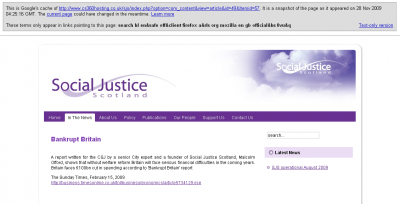Malcolm Offord
Malcolm Offord is a 'Partner of Charterhouse having joined the firm in June 1998 from Bankers Trust Company where he had been a Managing Director in the European Leveraged Finance Group.[1] Prior to his two years at Bankers Trust, Offord 'spent two years in venture capital with 3i and, before that, six years in M&A with Lazard.' Offord 'focuses on Charterhouse's origination activities in a number of sectors including financial services, consumer brands and media. He has been responsible for originating and exiting the successful Charterhouse investments in Tussauds, Avent and Saga, and was a non-executive director of Coral Eurobet. Since then, he has originated and led the transaction teams for Drive Assist UK, Acromas Holdings (the new company created following the £6.15bn merger of Saga and The AA in July 2007), Giles Insurance Brokers Limited and most recently, in June 2009, the £550 million MBO of Wood Mackenzie.'[2]
Contents
Early life
Offord 'was born and educated in Greenock'.[3] He 'is an honours graduate in Law from Edinburgh University.'[4]
Think Tank connections
Offord is also a founder of Social Justice Scotland[5]He was appointed a Director on 31 August 2009[6], and terminated on 13 December 2009[7]; member of the Advisory Board of the Centre for Social Justice[8][9]
Politics
Offord is a donor to Michael Gove MP, giving £2500 (direct donation) on 3 November 2009 (Date of acceptance: 26 November 2009 (Registered 25 November 2009))[10]
Charitable Work
Offord reportedly set up the Badenoch Trust with his wife Libet Offord.[11]
The Trust reportedly £100,000 'so that people in Inverclyde can go on life-changing courses with pioneering organization Columba 1400.'[12] Columba 1400 was founded by 'Greenockian Norman Drummond and describes its core mission as being to realise the leadership potential of young people who have been through tough times. It is a highly-regarded community and international leadership centre which has a strong track record of enabling young people to find their way into work and College.'[13] Offord 'also invited all interested parties in Inverclyde including private individuals, businesses and the local authority to match fund his donation in order to make available more opportunities for the people of Inverclyde.'[14]
The Trust was also a 'JMA Major Donor' (£100,000 +) to the The National Library of Scotland for the John Murray Archive and Offord was part of the 'JMA Campaign Group'.[15] Both the Badenoch Trust andOfford himself are listed as being 'James Clerk Maxwell Patrons (£50,000 and over)' by the University of Edinburgh in 2007/8[16]
Affiliations
Resources
- Charterhouse Malcolm Offord, accessed 13 March 2010
Notes
- ↑ Charterhouse Malcolm Offord, accessed 13 March 2010
- ↑ Charterhouse Malcolm Offord, accessed 13 March 2010
- ↑ DONATION Will Help Transform Lives, Inverclyde Now 07 December 2007
- ↑ Charterhouse Malcolm Offord, accessed 13 March 2010
- ↑ Bankrupt Britain, SJS website, Google cache 28 Nov 2009
- ↑ Appointment of director, Malcolm Offord, Companies House document retrieved 1 Feb 2010. Some personal information blocked out by SpinProfiles editors.
- ↑ Termination of appointment of director, Malcolm Offord, Companies House document retrieved 1 Feb 2010
- ↑ Bankrupt Britain, SJS website, Google cache 28 Nov 2009
- ↑ Social Justice Scotland Directors, SJS website, cached version of the page as it appeared on 25 Jan 2010 22:42:25 GMT, accessed in Google cache 6 Feb 2010
- ↑ They work for You Michael Gove, accessed 13 March 2010
- ↑ DONATION Will Help Transform Lives, Inverclyde Now 07 December 2007
- ↑ DONATION Will Help Transform Lives, Inverclyde Now 07 December 2007
- ↑ DONATION Will Help Transform Lives, Inverclyde Now 07 December 2007
- ↑ DONATION Will Help Transform Lives, Inverclyde Now 07 December 2007
- ↑ National Library of Scotland Support NLS: Donors, accessed 13 March 2010
- ↑ The University of Edinburgh Annual Review 2007/2008, p. 35, accessed 13 March 2010
